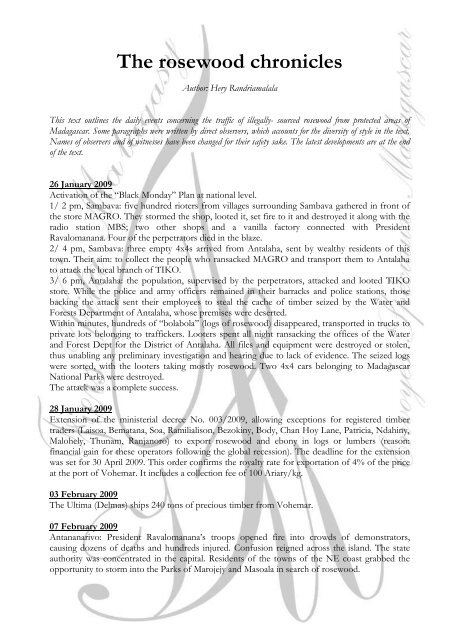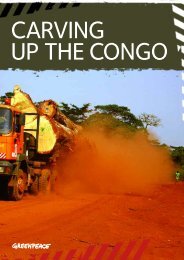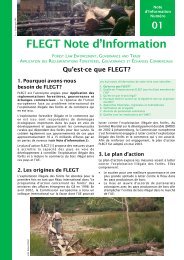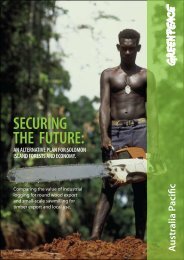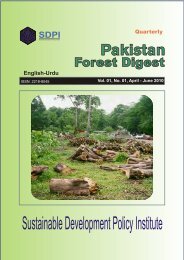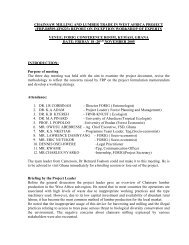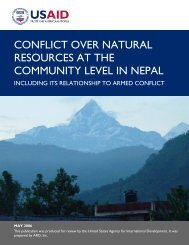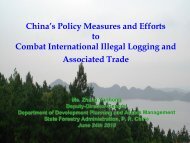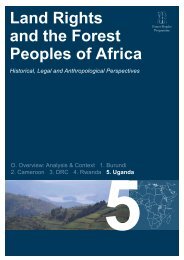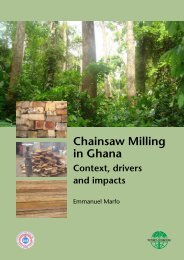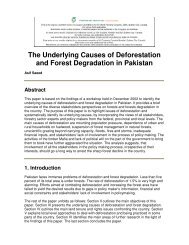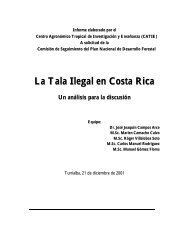The rosewood chronicles - Photo Index - Mongabay
The rosewood chronicles - Photo Index - Mongabay
The rosewood chronicles - Photo Index - Mongabay
Create successful ePaper yourself
Turn your PDF publications into a flip-book with our unique Google optimized e-Paper software.
<strong>The</strong> <strong>rosewood</strong> <strong>chronicles</strong><br />
Author: Hery Randriamalala<br />
This text outlines the daily events concerning the traffic of illegally- sourced <strong>rosewood</strong> from protected areas of<br />
Madagascar. Some paragraphs were written by direct observers, which accounts for the diversity of style in the text.<br />
Names of observers and of witnesses have been changed for their safety sake. <strong>The</strong> latest developments are at the end<br />
of the text.<br />
26 January 2009<br />
Activation of the “Black Monday” Plan at national level.<br />
1/ 2 pm, Sambava: five hundred rioters from villages surrounding Sambava gathered in front of<br />
the store MAGRO. <strong>The</strong>y stormed the shop, looted it, set fire to it and destroyed it along with the<br />
radio station MBS; two other shops and a vanilla factory connected with President<br />
Ravalomanana. Four of the perpetrators died in the blaze.<br />
2/ 4 pm, Sambava: three empty 4x4s arrived from Antalaha, sent by wealthy residents of this<br />
town. <strong>The</strong>ir aim: to collect the people who ransacked MAGRO and transport them to Antalaha<br />
to attack the local branch of TIKO.<br />
3/ 6 pm, Antalaha: the population, supervised by the perpetrators, attacked and looted TIKO<br />
store. While the police and army officers remained in their barracks and police stations, those<br />
backing the attack sent their employees to steal the cache of timber seized by the Water and<br />
Forests Department of Antalaha, whose premises were deserted.<br />
Within minutes, hundreds of “bolabola” (logs of <strong>rosewood</strong>) disappeared, transported in trucks to<br />
private lots belonging to traffickers. Looters spent all night ransacking the offices of the Water<br />
and Forest Dept for the District of Antalaha. All files and equipment were destroyed or stolen,<br />
thus unabling any preliminary investigation and hearing due to lack of evidence. <strong>The</strong> seized logs<br />
were sorted, with the looters taking mostly <strong>rosewood</strong>. Two 4x4 cars belonging to Madagascar<br />
National Parks were destroyed.<br />
<strong>The</strong> attack was a complete success.<br />
28 January 2009<br />
Extension of the ministerial decree No. 003/2009, allowing exceptions for registered timber<br />
traders (Laisoa, Bematana, Soa, Ramilialison, Bezokiny, Body, Chan Hoy Lane, Patricia, Ndahiny,<br />
Malohely, Thunam, Ranjanoro) to export <strong>rosewood</strong> and ebony in logs or lumbers (reason:<br />
financial gain for these operators following the global recession). <strong>The</strong> deadline for the extension<br />
was set for 30 April 2009. This order confirms the royalty rate for exportation of 4% of the price<br />
at the port of Vohemar. It includes a collection fee of 100 Ariary/kg.<br />
03 February 2009<br />
<strong>The</strong> Ultima (Delmas) ships 240 tons of precious timber from Vohemar.<br />
07 February 2009<br />
Antananarivo: President Ravalomanana‟s troops opened fire into crowds of demonstrators,<br />
causing dozens of deaths and hundreds injured. Confusion reigned across the island. <strong>The</strong> state<br />
authority was concentrated in the capital. Residents of the towns of the NE coast grabbed the<br />
opportunity to storm into the Parks of Marojejy and Masoala in search of <strong>rosewood</strong>.
08 February 2009<br />
In Marojejy National Park (NP), the timber traffickers prepared to move hundreds of logs/<br />
„bolabola‟ for loading onto trucks. Residents from surrounding villages objected, as it affected<br />
50% of the revenue generated by the park, which was distributed by Madagascar National Parks,<br />
the organization responsible for its management. Timber traders dispersed the crowd by warning<br />
shots from automatic weapons. <strong>The</strong>ir leaders travelled to Andapa, and threatened the Parks<br />
Director to burn his house if he tried to stand in their way. <strong>The</strong> MNP Director decided to close<br />
the park to the public and sent a warning out to Antananarivo.<br />
14 February 2009<br />
<strong>The</strong> Ultima (Delmas) shipped 2966 tons or precious timber from Vohemar.<br />
17 February 2009<br />
<strong>The</strong> Providence (UAFL) shipped 618 tons of precious timber from Vohemar.<br />
18 February 2009<br />
A Safmarine ship transported 520 tons of precious timber from Toamasina.<br />
25 February 2009<br />
<strong>The</strong> Ultima (Delmas) shipped 1034 tons of precious timber from Vohemar.<br />
06 March 2009<br />
<strong>The</strong> Providence (UAFL) transported 374 tons of precious wood from Vohemar.<br />
08 March 2009<br />
<strong>The</strong> Ultima (Delmas) shipped 327 tons of precious wood from Vohemar.<br />
17 March 2009<br />
President Ravalomanana was ousted in a coup and left the country. Andry Rajoelina assumed<br />
Presidency of the High Authority of Transition (HAT). 1<br />
18 March 2009<br />
<strong>The</strong> Kiara (Delmas) transported 1060 tons of precious timber from Vohemar.<br />
20 March 2009<br />
<strong>The</strong> Ultima (Delmas) shipped 85 tons of precious timber from Vohemar.<br />
21 March 2009<br />
A Safmarine ship shipped 520 tons of precious timber from Toamasina.<br />
27 March 2009<br />
<strong>The</strong> Ultima (Delmas) shipped 734 tons of precious timber from Vohemar.<br />
30 March 2009<br />
Some prominent international NGOs: WWF, WCS, CI, etc. obtained an appointment with the<br />
minister of the environment to alert people about the plight of in the protected areas in the<br />
1 See additional information:<br />
http://www.journal-le-democrate.com/index.phpoption=com_content&view=article&id=36%3Anorbert-lala-ratsirahonana-le-probleme-demadagascar-&catid=1%3Aactualites<br />
http://reflexiums.wordpress.com/2011 January 22/madagascar-chronologie-du-coup-detat-de-mars-2009-par-le-colonel-andrianasoavina-charles/
Northeast. <strong>The</strong> Minister made a public statement reiterating the ban on logging within protected<br />
areas. Masoala National Park is affected in turn by illegal logging 2 .<br />
04 April 2009<br />
1/ A trader stated, in reference to his cohorts logging in Marojejy: “In their reports for export<br />
request to the Ministry, there are many false statements concerning the [timber] stocks. Once this<br />
authorization secured, the exporters rush to reach the quantity authorized and then deliver the<br />
timber to the port as soon as possible. <strong>The</strong>refore, panic set in and the collectors sought solely to<br />
reach their quotas. Some collectors cheated by inserting sand or pebbles inside hollow logs to<br />
increase the shipping weight. By night other collectors plunder stocks belonging to different<br />
traders. Every night the bars of the villages were run by collectors and transporters, who splashed<br />
out their earnings until the mornings - more so on weekends. Peoples‟ behaviour changed as<br />
aggression and ruthlessness set in. <strong>The</strong>y boasted of their newfound wealth, without considering<br />
consequences, risks and regulations. <strong>The</strong> police patrolling Manantenina received 5000 Ariary,<br />
according to conversations I overheard in taxi brousses. <strong>The</strong>re were even customers of Belaoko<br />
Lokoho who stopped a bus to ask if it can carry timber. <strong>The</strong> driver refused. In the bus,<br />
passengers discussed the logging within the Park. <strong>The</strong>y noticed that the wood collectors emerged<br />
from the park to ascertain the reaction of the new President (TGV), fearing that he may<br />
implement a new law for the protection of the Park. But during his visit to Sambava on April 4,<br />
the President did not mention the problem of [logging in] the park. So the loggers returned to the<br />
park with far more confidence."<br />
2/ Two candidates competed for position of Head of the SAVA region: Marcellin and Abdillah.<br />
Marcellin, who in February told SAVA citizens on the [local] radio station to “log as much as they<br />
want within the forest because now we are in democracy”, therefore gave a signal to the loggers<br />
to continue. He recruited the people who organized the riots in late January in the SAVA (the<br />
"Black Monday" plan). However Rajoelina selected Abdillah as Head of SAVA region. <strong>The</strong><br />
Timber Cartel of Antalaha paid 60 million Ariary for that move.<br />
05 April 2209<br />
Loggers re-enter the forest, more determined than ever.<br />
10 April 2009<br />
Numbers of people logging in Marojejy continued to increase. Given that the traffic was<br />
approaching an end, the rush for whatever accessible timber remained, intensified. Whatever the<br />
size of the trees, everything had to go. <strong>The</strong> paved road from the trail to Mandena was streaked<br />
with red, referred to by many as the „tears of blood left by the mutilated <strong>rosewood</strong> trees logged<br />
without any scruples‟. <strong>The</strong>re were masses of stocks in Antalaha (belonging to and involving<br />
Thunam and his brothers and sisters, Jeannot Ranjanoro, Bematana, Bezokiny – hotel<br />
Palissandre, Paula Maurice – Ocean Momo, Jacky Manambola, amongst others)… <strong>The</strong> chief<br />
collector in Mandena was Lys. In Andrakata, Clovis collected for Jeannot Ranjanoro.<br />
13 April 2009<br />
A primatologist stated: “I do not know if you know „the butcher‟ of Anoviara, Simon, former<br />
mayor of Anoviara His wife is now mayor. He has been hunting for thirty years in the<br />
surrounding forests. He makes it his business: ten trained dogs, and uses shotguns (cartridges<br />
were found). He kills everything that these dogs sniff out, [it is] a massacre. You can estimate<br />
2 See additional information:<br />
http://www.fichier-pdf.fr/2011 August 08/2009-03-27-masoala-note-pr-sentation-bois-de-rose-et-infraction/<br />
http://www.fichier-pdf.fr/2011 August 08/2009-04-08-lettre-dir-masoala/<br />
http://www.fichier-pdf.fr/2011 August 08/2009-04-09-masoala-rapport-exp-1-re-partie/<br />
http://www.fichier-pdf.fr/2011 August 08/2009-04-09-masoala-rapport-expl-annexe/
etween 3000 and 5000 animals killed by him. He sells the meat to the Chinese community of<br />
SAVA, Toamasina and even Antananarivo... He ventures deep into the Makira [Natural Park]<br />
rainforest to hunt ... <strong>The</strong>re, in the same territory are Varecia rubra, also Varecia variegata, hybrids of<br />
these populations, Simponas (Propithecus candidus), Babakoto (Indri indri), the White-fronted lemur<br />
(Eulemur albifrons), also Crowned lemur, Avahi, Lepilemur, the aye-aye; the Hapalemur griseus and<br />
another species of lemur that may be Prolemur simus. Because of the „butcher‟, animals are<br />
terrorized by, and flee man by his smell. "<br />
18 April 2009<br />
<strong>The</strong> Ministry of Environment, Water and Forest closed the port of Vohemar to exportation of<br />
<strong>rosewood</strong>.<br />
19 April 2009<br />
A special plane was chartered for a round trip Antalaha-Antananarivo, with a delegation of timber<br />
exporters on board. <strong>The</strong>y were welcomed by members of the High Authority of Transition.<br />
20 April 2009<br />
Trucks returned to their schedules of transporting timber-laden containers to the port of<br />
Vohemar, where they remained in port awaiting a government decision which did not materialize.<br />
21 April 2009<br />
Loggers moving from Antalaha southwards joined with their counterparts from Maroantsetra<br />
traveling northwards, in the heart of Masoala.<br />
15 May 2009<br />
200 containers of <strong>rosewood</strong> were blocked for a month on the banks of Vohemar. <strong>The</strong><br />
Government was aware that numbers reported by the exporters are false. Wholesalers believe that<br />
this decision is only a tactic to raise the scale of “commissions”. <strong>The</strong> shipping companies no<br />
longer sent their vessels to Vohemar 3 .<br />
13 July 2009<br />
<strong>The</strong> Minister of Environment sent a letter to the Regional Direction of Waters and Forest and<br />
Tourism, asking him to search for transactions pre trial, in connection with the 72 million Ariary<br />
fine per container, filed at the port of Vohemar. If the documentation was not forthcoming, he<br />
insisted on prosecuting traders, seizing and selling the timber.<br />
18 July 2009<br />
A guide on his way back from a hike in the Masoala with a tourist and a student, reported the<br />
presence of a large number of people in frenetically logging inside the park. Some were transporting<br />
trunks, others piling logs. <strong>The</strong>y observed that the forest was almost stripped bare, and that animals<br />
flee from people. A farmer confessed to 26 lemurs poached in two weeks 4 .<br />
20 July 2009<br />
Members of the HAT promised the timber traders that they would pay for half the fine of 72<br />
million Ariary per container, and that nobody should rush to pay it. But one operator had already<br />
paid the entire amount.<br />
3 See additional information: http://www.fichier-pdf.fr/2011 August 08/2009-07-22-rapport-de-mission-sava/<br />
4 See additional information: http://www.fichier-pdf.fr/2011 August 08/2009-07-16-compte-rendu-bois-de-rose-masoala/
30 July 2009<br />
<strong>The</strong> minister of Environment decided (Decision No. 338 September MEF/MI) to allow the<br />
export of 25 containers of <strong>rosewood</strong> for each of the 13 operators connected with the Decree<br />
003-2009, subject to payment of a fine of 72 million Ariary per container.<br />
15 August 2009<br />
1/ <strong>The</strong> situation was almost calm in the Marojejy. Rosewood loggers left the park: too many<br />
policemen, growing hostility among the residents bordering the Park, no more easily accessible<br />
<strong>rosewood</strong>.<br />
2/ Things went awry in the Masoala, around Maroantsetra and in Mananara: loggers became<br />
more numerous than ever, the logging moving southwards 5 .<br />
3/ <strong>The</strong> <strong>rosewood</strong> Cartel is incensed by the fine of 72 million Ariary per container. Only one<br />
exporter had paid to date. <strong>The</strong>y stated that “they will not help anyone during the next election.”<br />
And that “If the government is against them, no problem, they will wait for the next one.”<br />
19 August 2009<br />
<strong>The</strong> piles of a wooden bridge near Ambatojoby (30 km north of Sambava) were stolen: they were<br />
made of <strong>rosewood</strong>. Now the bridge is rickety and dangerous for vehicles and the only access to<br />
the village is essentially cut.<br />
20 August 2009<br />
According to a traveller who bypassed the Masoala along the coast, there were many people on<br />
the road in both directions. People did not talk, they kept their actions secret: where were the<br />
police Numerous logs were stacked on beaches or in river mouths, awaiting transport boats.<br />
New villages mushroomed almost overnight, populated by loggers, collectors, retail dealers,<br />
prostitutes and eateries. Prices were high because of the abundance of money, the influx of<br />
customers and lack of supplies. A beer bottle was 8000 Ariary, palm alcohol 1500. Many people<br />
died accidentally (log carriers in rough terrain) or due to crime (fighting, drunken brawls and<br />
theft). No police were visible in the area.<br />
21 August 2009<br />
1/ <strong>The</strong> National Radio of Maroantsetra announced in the morning that an officer of the National<br />
Park of Mananara had both legs broken by the <strong>rosewood</strong> barons‟ messengers from Antalaha. He<br />
was trying to stop loggers entering the park. But several hundred entered the park, with official<br />
documents bearing all kind of signatures. “<strong>The</strong> villagers and local officials will be decapitated if<br />
they continue to interfere with loggers”, was the warning sent out by the Mafia of Antalaha.<br />
2/ In the Masoala, the woodcutters were armed and hunted lemurs and birds extensively.<br />
3/ According to a traveller coming back from the heart of Makira (3 days walk), the logging had<br />
reached record levels.<br />
30 August 2009<br />
1/ With certainty <strong>rosewood</strong> was shipped from Toamasina. Traders of other goods from SAVA<br />
had their consignments blocked in Toamasina since June due to lack of available boats: all ships<br />
calling at from Antalaha to Toamasina were there to load <strong>rosewood</strong>. But it seemed that <strong>rosewood</strong><br />
was no longer sent from Antalaha. It was instead transported directly to from the Masoala to<br />
Toamasina, where it was exported “quietly and normally.” 6<br />
5 See additional information: http://www.fichier-pdf.fr/2011 August 08/2009-08-01-bois-de-rose-mananara/<br />
6 See additional information: http://www.fichier-pdf.fr/2011 August 08/2009-09-01-masoala-compte-rendu-bois-de-rose/
2/ Traders received funding from their Chinese buyers. <strong>The</strong>y were actually paying their debts to<br />
their workers in the Masoala and in Mananara, but not to those of Marojejy, to whom they said<br />
“your money is stuck in the port of Vohemar.”<br />
3/ Exporters of vanilla were extremely embarrassed and badly hit by a decision of the Minister of<br />
Trade, implementing a decree setting the floor price of vanilla exports, to US$ 27 a kilo. Exports<br />
below this threshold were banned. Result: almost no vanilla sold in 2009. Even at US$ 20/ kg,<br />
nobody would buy it. Vanilla exporters were incensed by the incompetence of the government<br />
and sent an open letter in the press. Another consequence was that farmers had no income that<br />
year, thus being forced to reluctantly seek employment as <strong>rosewood</strong> cutters.<br />
01 September 2009<br />
1/ A newcomer surfaced among the traders: Rachid Patel, from the Indian community in<br />
Antalaha, with a warehouse and yard full of <strong>rosewood</strong> logs. He was the first Indian spotted in the<br />
timber mafia, hitherto the domain of the Chinese. His son-in-law from Antananarivo, had lots of<br />
money to invest.<br />
2/ Five traders were allowed to transfer their wood from Antalaha to Toamasina. Bezokiny (hotel<br />
Palissandre) was one of them.<br />
3/ Ranjanoro went berserk: his transport permit was denied. He threatened everyone, “the first<br />
who is transferring timber to Toamasina, will have his boat burnt!” And he added: “If this<br />
government does not allow <strong>rosewood</strong> trade, we will await the next government.”<br />
4/ In Maroantsetra, the minister of Tourism has responded to the open letter of tour operators.<br />
She would stop the trafficking of <strong>rosewood</strong>. Indeed, the day before, 18 logs were seized by the<br />
police and agents of Madagascar National Parks. Consequently these tour operators have received<br />
death threats from <strong>rosewood</strong> traders. <strong>The</strong>y were also concerned about official authorities: the<br />
mayor wrote to the HAT to request that the minister of Environment remains in office.<br />
05 September 2009<br />
Maroantsetra: when the city lives at the time of <strong>rosewood</strong> trafficking. Nightclubs opened several<br />
nights a week, money flowing everywhere. Minor sellers sought <strong>rosewood</strong> in the heart of the<br />
rainforest. Collectors all had bikes. Trucks operated day and night. No more ship made stops for<br />
regular cargo at the port – instead, all transported <strong>rosewood</strong>, creating shortages of basic goods.<br />
<strong>The</strong> wives of senior officials were seen in the villages surrounding the Masoala, buying <strong>rosewood</strong>.<br />
A <strong>rosewood</strong> based economy is established with:<br />
- loggers: over 50% of villagers around the Park were missing, including women.<br />
This meant all healthy adults were in the forest.<br />
- sailors: rotated between the beaches of Masoala and Maroantsetra and then<br />
between this town, Antalaha and Toamasina<br />
- the dockers of Maroantsetra.<br />
- the collectors and the buyers.<br />
- the wholesalers, small or large.<br />
- the officials, more or less involved.<br />
<strong>The</strong> precious timber trade was so widespread that it almost appeared legal.<br />
14 September 2009<br />
Mr Risy had been hunting red ruffed lemur (Varecia rubra) for 2 months in the western part of the<br />
Masoala National Park. He used a 12-gauge shotgun with a silencer. Of the 30 individuals<br />
recorded in the Lohatrozona sector since 2008, only 15 remain today.
17 September 2009<br />
A Delmas vessel‟s arrival was announced for September 22 in Vohemar. Its purpose: to load all<br />
the <strong>rosewood</strong> containers awaiting transportation for the previous 6 months.<br />
18 September 2009<br />
1/ Masoala: the situation worsened in Ambodiforaha, a small village near Tampolo Lodge: 100<br />
<strong>rosewood</strong> loggers got drunk every night in the village and then left at dawn to go to log<br />
<strong>rosewood</strong> 7 .<br />
2/ <strong>The</strong> private stock of Mr Abdillah, head of the SAVA region, was estimated at “more than 100<br />
tons.” This was split into caches and hidden in the properties of his family.<br />
3/ In the capital city, 40 Chinese buyers lobbied for several days to reopen the port of Vohemar.<br />
<strong>The</strong>y had a considerable amount of money involved with this case. Failing to convince the Prime<br />
Minister, they left the country extremely angry.<br />
20 September 2009<br />
Illegal logging continued in Andrahanjo, Marojejy Park.<br />
21 September 2009<br />
<strong>The</strong> MEF extends the Inter-Ministerial Order No. 38244/2009 which allowed for „exceptional<br />
and registered‟ export of 25 containers of <strong>rosewood</strong>, ebony and „palissandre‟ (lower valued<br />
<strong>rosewood</strong> without the red or maroon colouring) for each of the 13 licensed operators in January,<br />
on receipt of payment of the required 72 million Ariary per container. <strong>The</strong> authorization was set<br />
to expire by November 30, 2009. <strong>The</strong> collecting fee increased to 500 Ariary/kg; the exportation<br />
fee to 5% of the FOB price.<br />
23 September 2009<br />
1/ Maroantsetra / Makira: a few days previously, Chinese buyers were observed at the Bank of<br />
Africa. Rosewood logs were in evidence everywhere in town and on the sides of the tracks.<br />
Diameter: over 40 cm, length: more than 3.5 m. Trucks and boats unloaded and uploaded timber<br />
in broad daylight. Fifty tons arrived a few days prior in Toamasina. A ship of 150 tons arrived in<br />
Maroantsetra and all caches were cleared. <strong>The</strong> prices were as follows:<br />
- 200 Ariary/kg in the forest,<br />
- 1200 Ariary/kg in Maroantsetra,<br />
- 2400 Ariary/kg in Toamasina,<br />
- 12,000 Ariary/kg from Toamasina.<br />
All local business people are involved in the precious timber traffic, and quite brazenly so. <strong>The</strong>y<br />
stated they would sell timber in Toamasina and return with all kind of goods for sale on site, with<br />
the permission of officials. <strong>The</strong> park managers went into hiding: one Masoala ranger went to<br />
Antananarivo, one from Mananara to Toamasina. In the Masoala, logging happened in the full<br />
view of the few tourists staying in the lodges. Some tour operators turned: their fast boats didn‟t<br />
carry tourists anymore, but <strong>rosewood</strong> instead. <strong>The</strong> government negotiated fiercely with the<br />
timber traders. It requested 60 million Ariary per container, the traders offered 24 million.<br />
2/ Survey on the financing of the <strong>rosewood</strong> traffic: a few weeks before, traders lacked cash<br />
following the blocking of 170 containers at the port of Vohemar. However, they continued to be<br />
very active in the Masoala and Makira. How did they fund this activity Three sources were<br />
identified:<br />
a- the new Chinese of Madagascar. Before 2009, the Prime Minister (PM) of Ravalomanana<br />
had a lucrative trade: he sold national passports to Chinese migrants (5,000,000 Ariary<br />
each passport). At that time the Chinese arrived en masse in the capital city (about 20,000<br />
7 See photos at : http://www.fbgw.fr/fichier-pdf/fichier/62521/
people located around Behoririka). <strong>The</strong>se migrants do not speak a word of Malagasy, they<br />
came from remote areas of China, and six months later, they were Malagasy citizens! After<br />
a few weeks, they were able to buy land in the city (legal for nationals) and to open<br />
businesses. This active community imports goods from China, selling them in<br />
Antananarivo, but the money does not return to China. Instead, it is deposited into a<br />
“black bank”: it is lent to Chinese business people (buyers of <strong>rosewood</strong> in this case) who<br />
need cash in Madagascar. In return, these same business people in China payed the<br />
Behoririka traders. And so, they have in Madagascar access of money to prepay <strong>rosewood</strong><br />
shipments.<br />
b- the PM Monja Roindefo, was involved in the <strong>rosewood</strong> trade. He also embezzled the<br />
funds allocated for the drilling of fresh water in the arid South (about 3 million dollars<br />
from the African Development Bank) to buy <strong>rosewood</strong> in the Northeast. This was<br />
connected with the project leader, Mr Didier Betsiaroana, whose brother Jean Galbert is a<br />
notorious trader of <strong>rosewood</strong> (already held in 2008).<br />
c- the current selling of the <strong>rosewood</strong> stock via Toamasina (see No. 1), which allows for<br />
cash turnover.<br />
28 September 2009<br />
Antalaha: there was unrest in the city and around the port. Mrs. Chan Hoy Lane Kara, a trader,<br />
received approval to move her timber from Antalaha to Antsiranana. She was loading her trucks,<br />
but before departure, the convoy was attacked by other traders and dockworkers, who maintained<br />
that the same treatment should apply to everybody. <strong>The</strong> trucks were unloaded. Coco Rassamy<br />
appeared in Antalaha: a real villain, with an extensive criminal record, he claims to have 800 tons<br />
of <strong>rosewood</strong> for export.<br />
29 September 2009<br />
1/<strong>The</strong> few diehards who defend the forest in Maroantsetra started fearing for their lives. Death<br />
threats were commonplace. <strong>The</strong>y were clearly briefed that traders will kill anybody obstructing<br />
them.<br />
2/ Vohemar: A Delmas vessel was expected. In the port, there were 3 containers of vanilla, 3 of<br />
coffee and 170 of <strong>rosewood</strong>. After receiving a fax concerning the timber, the representative of<br />
Delmas sped to Antalaha to meet the timber traders. He requested evidence that the timber was<br />
legally sourced.<br />
30 September 2009<br />
1/ Coco Rassamy it transpires, works for Eric Foeng, an exporter of vanilla from Ampanefena,<br />
now trading in <strong>rosewood</strong>. He owns a large warehouse south of Antalaha, full of logs (at least 800<br />
tons). <strong>The</strong> interesting point is that it is financed by Chinese from the capital city.<br />
2/ In Vohemar, the <strong>rosewood</strong> barons failed to reach an agreement with the Treasury. Since they<br />
have no money to pay the 72 million Ariary fine per container, they offered to pay after the<br />
departure of the boat, once Chinese buyers have paid their bills. <strong>The</strong> Treasury rejected this illegal<br />
arrangement and everything appears blocked.<br />
3/ In Toamasina, someone has already exported 300 containers (over 6000 tons) of <strong>rosewood</strong>.<br />
Sam Som Miock, is Malagasy of Chinese origin who became rich thanks to the lychee industry.<br />
He still had 15 containers of <strong>rosewood</strong> awaiting the next boat. He proposed a solution for the<br />
Treasury: he would purchase the containers loaded with <strong>rosewood</strong> from those who cannot pay<br />
the fines and taxes, pays for them, and he exports to their account.<br />
4/ Delmas must collect 147 containers of <strong>rosewood</strong> the following Friday from Vohemar.<br />
5/ Claude Bezokiny (hotel Palissandre Antalaha) was poised to export 25 containers with a<br />
Safmarine ship arriving Oct. 10 in Vohemar.
4 October 2009<br />
<strong>The</strong> Lea (Delmas) loads up 2208 tons of precious timber in Vohemar.<br />
06 October 2009<br />
1/ By order of the Minister of Finance, <strong>The</strong> Lea (Delmas) was blocked at the port of Vohemar<br />
throughout the weekend as 66 containers of <strong>rosewood</strong> were loaded on board and exporters have<br />
not paid their taxes and “fines”. <strong>The</strong>y were given the consent of the Receiver to pay only once<br />
the boat at sea, which is illegal, hence, the reaction of the Minister. But the traders responded:<br />
they killed three zebu and distributed a vast quantity of alcohol to the crowd, who then attacked<br />
the port and threatened to destroy everything. <strong>The</strong> captain of the port had cleared <strong>The</strong> Lea to sail<br />
at 2 pm for security reasons. But instead of sailing to Port-Louis as planned, the vessel is confined<br />
in territorial waters. In addition, the parent company of Delmas has serious financial problems. It<br />
immediately needs 380 million euros to pay for the 50 vessels ordered in South Korea.<br />
2/ International NGOs issued and disseminated a statement condemning the way the Malagasy<br />
government was handling the <strong>rosewood</strong> crisis.<br />
09 October 2009<br />
<strong>The</strong> Lea affair, recalled in Toamasina by order of the Minister of Finance:<br />
- 90 containers were unloaded (all cargo),<br />
- 78 were in „in order‟,<br />
- 12 had absolutely no papers <strong>The</strong>y all belong to Thunam.<br />
<strong>The</strong> list of parties complicit was thus established as follows:<br />
- the Delmas company and its local representative: no one can load 12 containers on<br />
a ship without the captain‟s knowledge.<br />
- the Captain of the port of Vohemar,<br />
- the Collector of Customs in Vohemar,<br />
- the Regional Director of Water and Forests (already suspended since the day<br />
before),<br />
- most members of the Task Force (they attended the loading and turned a blind<br />
eye).<br />
16 October 2009<br />
1/ a 4x4 car veered off the road in Farahalana (20 km south of Sambava) as a result of which its<br />
four occupants were seriously injured. <strong>The</strong>y were evacuated to Antalaha where an aircraft fetched<br />
them to fly them to Antananarivo for treatment. <strong>The</strong> four occupants were members of the Task<br />
Force, the purpose of which was to combat <strong>rosewood</strong> trafficking. Residents of Farahalana found<br />
25 million Ariary in cash (bribery money) in the damaged vehicle and handed the sum to the<br />
gendarmes. <strong>The</strong> chartering of the aircraft (15 million Ariary) was paid by Mr Ranjanoro and Mr<br />
Laisoa, two major timber barons of Antalaha. <strong>The</strong>y were called to Antananarivo to be<br />
congratulated by the Minister of the Interior as “benefactors of the Police”.<br />
2/ William Guerra sold his “right” to export 25 containers to Sam Som Miock.<br />
22 October 2009<br />
1/ Delmas was about to curtail its involvement in the transportation of <strong>rosewood</strong> from<br />
Madagascar. <strong>The</strong> company had reached the end of its tether with constant problems and<br />
considered emptying its containers already filled with <strong>rosewood</strong>, on site.<br />
2/ A member of the HAT decided to halt all exports of <strong>rosewood</strong> until the timber traders had<br />
paid all taxes. This would likely take some time...<br />
3/ Vohemar customs officers were under pressure: they were under investigation for corruption<br />
when they claimed to have no responsibility for verification of <strong>rosewood</strong> documents. Correct: all
documentation is prepared and signed by the Regional Direction of Waters and Forests and<br />
Tourism.<br />
4/ According to witnesses, there were no more <strong>rosewood</strong> logs in the Masoala. Soldiers were<br />
everywhere; they stopped the villagers (at least for 24 hours, until the villagers paid them<br />
something). That was sufficient to clear the park of loggers.<br />
5/ <strong>The</strong> Mauritius (UAFL company) was delayed to October 30. It was to be followed by a ship<br />
belonging to Delmas.<br />
6/ Some traders began fearing consequences of selling <strong>rosewood</strong>. One of them proposed ebony<br />
instead as it is “less sensitive” [an issue] » 8 .<br />
7/ <strong>The</strong> decree of September 21 encouraged the opening of many <strong>rosewood</strong> export companies.<br />
<strong>The</strong>re are many forms by which they used when calling on the authorities to check their stocks,<br />
and as these were drafted without authorization, they are illegal. Most of these applications were<br />
accepted, thereby legalizing the illegal. <strong>The</strong> „<strong>rosewood</strong> phenomenon‟ began spreading in the<br />
capital city.<br />
27 October 2009<br />
1/ Logging continued apace in the Makira Natural Park, a particularly good source of <strong>rosewood</strong>.<br />
2/ <strong>The</strong> Minister of Agriculture authorized the fishing of sea cucumbers from the beaches around<br />
the Masoala, despite the presence of several marine reserves off the coast.<br />
3/ <strong>The</strong> Mauritius was shortly able to upload <strong>rosewood</strong> in Vohemar. Some containers were<br />
starting to be packed with <strong>rosewood</strong>.<br />
4/ A total of 52 bank accounts of <strong>rosewood</strong> traders were closed since Saturday, including that of<br />
Bezokiny Claude.<br />
5/ Seven traders including Thunam were put on trial at the Court of Toamasina.<br />
28 October 2009<br />
1 / Prior to 2002, Mr Rakoto Jean-Paul was a friend of Didier Ratsiraka, and made his fortune<br />
trading with the Customs in Toamasina. He left Madagascar with Ratsiraka, sensing the<br />
impending changes with Marc Ravalomanana. He is now back home, a wealthy man: he bought<br />
the entire quantity of already logged <strong>rosewood</strong> around Mananara.<br />
2/ News from <strong>The</strong> Mauritius: the boat was delayed to 1 or 2 November. Loading of containers<br />
was accelerating at Vohemar: 20 containers for Ndahiny Gregoire,10 for Bematana Martin, 10 for<br />
Guerra William, 3 for Chan Lane Kara and 12 for Body Thierry.<br />
30 October 2009<br />
<strong>The</strong> Mauritius (UAFL) moved 761 tons of precious wood from Vohemar.<br />
04 November 2009<br />
Coco Rassamy obtained authorization to transport 5000 logs from Cap-Est to Antalaha.<br />
Reminder: 5000 logs are<br />
- 1000 tons<br />
- 200 containers<br />
- 40 million dollars, delivered at Hong-Kong<br />
- 2500 canoe trips<br />
- 100 trips by „teuf-teuf‟ (small diesel-operated boats)<br />
- 200 truck trips.<br />
8 See additional information: http://www.fichier-pdf.fr/2011/08/08/2010-12-16-field-report-ebony-concession-th-nagel-timbertradel/
03 November 2009<br />
Sam Som Miock exported 17 containers of <strong>rosewood</strong> from Toamasina. He declared them as<br />
being 20 feet long, whereas they were 40 feet in length, with the approval from the local Customs<br />
representative.<br />
11 November 2009<br />
Judgement of the trial of Thunam in Toamasina: a 100 million Ariary was paid to whom it may<br />
concern and Thuman walked free.<br />
15 November 2009<br />
One observer close to the timber-trading syndicate commented:<br />
“<strong>The</strong> Chinese mafia is now noticeably active in the <strong>rosewood</strong> business. New contracts for the<br />
export of wood are still made between exporters and buyers. A contract of 10,000 tons had just<br />
been concluded by Bematana Martin. However, the deadline for the export of logs under the<br />
special authorization was set for the end of November. We heard the Chinese buyer saying<br />
arrogantly that the export will always continue in one way or another, because with their money,<br />
they think they can go through all the doors, even those at the highest level. It was said that one<br />
of the Chinese buyers will monopolize the export market along with someone in a high position.<br />
And that all other Chinese would go through him to get the timber out. Death threats have been<br />
delivered should anyone exceed the quota they have set. But the problem is that all traders say<br />
they own the lots. Exporters are money hungry: they accept all advances offered by the buyers.<br />
Yet there is not enough wood in stock. So should the illegal logging proceed again, in secret, even<br />
in protected areas One of the heads of the Mafia is in our country. It seems that if the Chinese<br />
community is threatened or if the Chinese have a problem between them, he is the one who will<br />
sort the problem in his own way. But the worst is the corruption within the Task Force. We also<br />
heard from villagers that the military allowed consignments of timber to go through the<br />
roadblocks if 200,000 Ariary was paid for each batch. <strong>The</strong> military commented that “it is a case<br />
like any other and that everyone should share.”<br />
20 November 2009<br />
About 120 members of the Task Force are involved in the <strong>rosewood</strong> trade. At hotel Palissandre<br />
(now called Hazo Vola, owner Claude Bezokiny), they socialise with the Masoala Park guards and<br />
with the loggers in the forest. <strong>The</strong> same happened at hotel Ocean Momo in Antalaha ... Jeannot<br />
Ranjanoro seemed the most active on this issue: all trucks encountered were transporting timber<br />
for him. It is in Ampanihy between Ratsianarana and Fampotakely (Masoala) that trafficking of<br />
timber is at its highest: 2000 to 3000 people work there. <strong>The</strong> FIS (Special Intervention Force) is<br />
present in Antalaha, but it focuses mainly on cultivating an African militia image: weapons over<br />
the shoulder, sunglasses, and whiskey in his hand.<br />
21 November 2009<br />
On the outskirts of Mananara: 3 military trucks unloaded <strong>rosewood</strong> in front of the house of Mr<br />
Herman Tsyvahiny for 15 hours.<br />
23 November 2009<br />
Many truck movements between Antalaha and Vohemar were being reported. A massive export<br />
of <strong>rosewood</strong> appeared to be imminent.<br />
27 November 2009<br />
Lucie is Malagasy and in her forties. She leads a simple lifestyle, like millions of other women in<br />
this country. She has a daughter; lives alone and does everything by herself. Usually, she buys 20<br />
bags of rice when the price is at the lowest and sells them when the price rises. Otherwise, she
sells used clothing. Last month, she traveled to Cap-Est, like many others, trying to see what she<br />
could sell. And she found the <strong>rosewood</strong> logs... She bought 10 logs (a ton, which mean small logs<br />
of second or third „grade‟) for 0.5 million Ariary. She found partners for transport: the rental of<br />
canoes to carry the logs to the mouth of the river and a Peugeot 404 to drive the timber to<br />
Antalaha. Transportation cost them a total of 300,000 Ariary, the cost of which they shared.<br />
From Cap-Est to Antalaha, they had to make it through three checkpoints set up by police /<br />
gendarmes / Task Force, and getting through these cost 30,000 Ariary each. Finally, for less than<br />
a million Ariary, Lucie made it to Antalaha with 10 logs. She sold them all for 1.6 million to<br />
Patricia Soa, pocketing a handsome profit. With this money, she returned to the forest for a<br />
second trip. It was more difficult because she had to walk a longer distance with the loggers to<br />
the heart of the forest in search of <strong>rosewood</strong>. “In this type of forest, we do not see the sun. It<br />
takes 4 days for the wet clothes to dry.” She made the same way back, at the same price. But in<br />
Antalaha, Patricia was absent. <strong>The</strong>n she sold her wood to Michel, who did not pay her (“I will pay<br />
you when the wood reaches Vohemar”). She learned too late, that Michael has a very bad<br />
reputation. And she lost each Ariary won, hanging onto the hope that she would be paid “one<br />
day”. In the forest, it was amazing: parties everywhere, beer and girls more expensive than in<br />
Antananarivo (beer cost 5000 Ariary instead of 1400 in the city, a working girl charged 50,000 to<br />
100,000 Ariary instead of 10,000 to 20,000 in town) Lucie even met a girl who confessed making<br />
some 500,000 Ariary for a week long “rental”! <strong>The</strong> working girls came from Sambava, Antalaha,<br />
Maroantsetra and Toamasina. And the noise – loud music everywhere, around the clock, and<br />
during the day one could hear the noise of motocross as each collector had bought his own.<br />
Sometimes people are taken to task and fined by combined Madagascar National Parks and<br />
gendarmerie patrols. If someone killed a lemur or a bird, or cut a tree, they pay 50,000 Ariary to<br />
the agents (who say “our bosses fill their pockets, why do not we do the same”). A lot of<br />
accidents happen in the forest. <strong>The</strong> cutters are exhausted because <strong>rosewood</strong> is so heavy. So they<br />
seek the shortest path to the river, leading them to the top of steep slopes overlooking river<br />
banks. <strong>The</strong>n they throw the logs from the top of the cliff, sometimes killing or wounding people<br />
below.<br />
When she was in Antalaha, Lucie found “God.” „God‟ here refers to Thunam, as people really<br />
like him because he pays well. Sometimes he may pay two years late, but he always pays. Last<br />
month, “God” was in prison. No problem: he asked his employees to bring five bags of rice for<br />
the convicts, so that everyone has enough to eat in prison. <strong>The</strong>y of course shared the rice with<br />
the guards and afterwards they organized a basketball game. Everyone was happy – „thank you<br />
God‟! But now Thunam has been released and the basketball team dissolved...<br />
Lucie added that there were many like her in the forest, and that it was just like the golden age of<br />
vanilla.<br />
27 November 2009<br />
1/ A docker died in Vohemar, crushed by a falling <strong>rosewood</strong> log during loading.<br />
2/ <strong>The</strong> Professional Association of Banks advised its members not to domicile <strong>rosewood</strong><br />
exporters. Some banks planned to close accounts of these clients.<br />
3/ Private flights were reported on a private aircraft at the airport of Sambava. <strong>The</strong> traders bring<br />
crates of cash to the Regional Directorate of Forestry of the SAVA, to pay the astronomical fines<br />
(72 million Ariary per container). This is the result of the closure of some accounts by banks, and<br />
the desire of traders to hide their financial dealings.<br />
30 November 2009<br />
In a note without reference, the PM Eugene Mangalaza decided that the exploitation, transport<br />
and trade of precious wood would be prohibited.
04 December 2009<br />
<strong>The</strong> Consistence (Delmas) shipped 3500 tons of precious wood from Vohemar, despite the<br />
deadline of 30 November for exports (decree of September 21, 2009) and the recall by the PM.<br />
<strong>The</strong> delay was due to time wasted counting the cash paid to the Customs and Water and Forest<br />
Regional Office.<br />
10 December 2009<br />
1/ Witnesses reporte strong transportation activity of <strong>rosewood</strong> on the outskirts of Antalaha.<br />
<strong>The</strong>se movements were presided over by members of the FIS. <strong>The</strong> head of this operation, Coco<br />
Rassamy would act on behalf of the interim president Andry Rajoelina (according to him).<br />
2/ Mrs Mangalaza, wife of the PM, filed an application for approval of <strong>rosewood</strong> exporting.<br />
3/ <strong>The</strong> prosecutor of the Court of Antalaha was in Maroantsetra. He sought a collector he knew<br />
to whom he has lent about 1000 euros, to invest into the <strong>rosewood</strong>. <strong>The</strong> collector had<br />
disappeared with his money.<br />
30 December 2009<br />
Delmas, under the pressure of the President of the HAT, stopped transportation of <strong>rosewood</strong><br />
from Vohemar.<br />
31 December 2009<br />
Based on a note No. 218-PM/SP.09, Camille Vital, new Prime Minister, confirmed the order<br />
38244, but without setting a deadline. Export of the timber could therefore resume. <strong>The</strong><br />
<strong>rosewood</strong> Cartel organized a large celebration party in Antalaha.<br />
01 January 2010<br />
More than 1000 loggers headed back to the forest of Masoala, wielding axes.<br />
06 January 2010<br />
1/ In Maroantsetra, activity resumed. Trucks loaded pieces of wood transformed into lumbers<br />
from a large warehouse in the city. <strong>The</strong> wood stored there is estimated to be at least 200 m3. <strong>The</strong><br />
leading traders explained to the collectors that they assured them of protection if they sell them<br />
their <strong>rosewood</strong>. If they refuse, threats were dished out. <strong>The</strong> former minister of the environment,<br />
a resident of Maroantsetra who had signed many authorizations to transport wood from<br />
Maroantsetra to Toamasina, was to run for the post of deputy. His campaign started.<br />
2/ Claude Bezokiny announced: “Everything is unlocked; I have TGV‟s agreement to export 115<br />
containers.”<br />
3/ Approximately 400 containers were prepared quickly in Vohemar.<br />
4/ <strong>The</strong> new representative of Delmas was not aware of this change in policy so he called his<br />
company‟s office in Marseille. <strong>The</strong> first answer was “no, we do not carry <strong>rosewood</strong> anymore, our<br />
last boat loaded only vanilla.” But minutes later, the answer changed to a go-ahead, following<br />
pressure from Patrick Leloup on Delmas.<br />
4/ <strong>The</strong> situation in Mananara was stagnant as there were not enough buyers. All the big<br />
<strong>rosewood</strong> trees had been felled in Makira Natural Park.<br />
07 January 2010<br />
1/ <strong>The</strong> two presidential advisers involved in the <strong>rosewood</strong> were identified: Mr Patrick Leloup, a<br />
Franco-Malagasy, and Sanjay, an Indian commuting between Reunion and Mauritius. <strong>The</strong> latter is<br />
known for his involvement in various trading and trafficking of goods (especially steel) during<br />
Ratsiraka‟s time. He left Madagascar with Ratsiraka to avoid being sentenced by Ravalomanana.<br />
He is now back.<br />
2/ Traders moved a large quantity of <strong>rosewood</strong> from Antalaha to Vohemar.
19 January 2010<br />
Eleven pictures were taken in Masoala National Park, near Antalaviana, during one hour of<br />
walking in the forest. <strong>The</strong>y showed <strong>rosewood</strong> of the best quality. Ten thousand of these logs were<br />
commissioned by someone in Antananarivo. Formal requests had been accepted by the<br />
authorities.<br />
23 January 2010<br />
<strong>The</strong> night before, 12 trucks were parked near the cemetery at the east entrance of Daraina,<br />
because of the rain barrier set up by the company which is responsible for road maintenance of<br />
the section from Daraina to Vohemar. At around 1 am, they decided to break through the rain<br />
barrier and headed to Ambilobe. <strong>The</strong> forestry administration of the SAVA and the renowned<br />
Task Force were chasing after the convoy which, according to the Head of the Forest office of<br />
Vohemar, “unlawfully” transported <strong>rosewood</strong>. Possibly suspension of the loading of precious<br />
wood in the port of Vohemar pushed some traders to find alternative ports from which evacuate<br />
their goods. Given the current state of the RN-5a track, the trucks were probably stuck<br />
somewhere between Maromokotra and Ambilobe.<br />
26 January 2010<br />
1/ Some Chinese visiting from China were been seen in Maroantsetra, most likely <strong>rosewood</strong><br />
buyers.<br />
2/ <strong>The</strong> twelve trucks loaded with <strong>rosewood</strong> were intercepted in Maromokotra. <strong>The</strong>y went from<br />
Vohemar to Antsiranana. <strong>The</strong> head of the convoy purported to act on behalf of the President.<br />
<strong>The</strong> traders included the son of the late Djaozandry Gaston, a naturalized Malagasy of Chinese<br />
origin living in Ampanefena. <strong>The</strong> trucks were sent to the outskirts of Sambava, to a military<br />
camp. <strong>The</strong>se are the following vehicles:<br />
- Mercedes truck 14 22, 46 33 DD, yellow color<br />
- Mercedes truck 16 22, 33 17 DD, blue color<br />
- Mercedes truck 19 28 , 40 49 DD, with trailer 12 45 TP<br />
- Truck 82 80 DD, with trailer 22 30 DE<br />
- Truck 86 79 DD, red color, with trailer 03 82 TV, yellow color<br />
- Truck 44 70 DD, orange color<br />
- Truck 18 34 DD, red color<br />
- Truck 82 81 DD, red color<br />
- Truck 76 10 DD, blue color<br />
- Truck 30 09 DD, red color<br />
- 4x4 car, black color, 16 90 AC<br />
- 4x4 car, white color, 52 77 DE<br />
27 January 2010<br />
A speedboat, among the most sophisticated in the area, departed from Maroantsetra to<br />
Mananara. On board were potential <strong>rosewood</strong> buyers (Malagasy nationals and Chinese). <strong>The</strong>y<br />
returned in the late afternoon.<br />
01 February 2010<br />
In Ambohimanarina, in the outskirts of Marojejy, numerous small restaurants had opened. That is<br />
where many <strong>rosewood</strong> collectors sat table, drinking with the military of the „Task Force‟. <strong>The</strong><br />
entry point of the park was re-designated to Anjiabe from where people said it was easier to<br />
access the <strong>rosewood</strong> logs. Marojejy was an easy target for the loggers. <strong>The</strong> access by Mandena
was almost impossible because the villagers await and resist loggers trying to enter the Park. <strong>The</strong><br />
Madagascar National Parks staff were regularly threatened 9 .<br />
10 February 2010<br />
<strong>The</strong>re was enough <strong>rosewood</strong> in Vohemar to fill 250 containers. 31 were already loaded, but no<br />
ship arrival had been announced. PM Albert Camille Vital was to visit Vohemar the next day, to<br />
find a solution to allow for the export of this wood. Traders were willing to help: as Delmas did<br />
not want to come to Madagascar to upload wood, they sought a man of influence able to change<br />
the shipping company‟s mind.<br />
15 February 2010<br />
According to a person who had just driven from Toamasina to Maroantsetra, there were no logs<br />
along the track, while they were there a month ago, in Anandranvola. Dozens of seized logs are<br />
stored in front of the gendarmerie in Mananara as they have no valid papers. Some of these logs<br />
have references, but photographing them was prohibited.<br />
27 February 2010<br />
1/ <strong>The</strong> traders moved towards Vohemar with many dockworkers to upload the timber into<br />
containers.<br />
2/ A Delmas ship unloaded many empty containers the previous week. She was to collect the<br />
filled containers in early March.<br />
3/ This export of <strong>rosewood</strong> was again, supervised by the two advisors of Rajoelina: Patrick<br />
Leloup and Sanjay. <strong>The</strong> general idea proposed was bartering “Rosewood against Rice.” This<br />
could mean taxes may be waived. Exporters would not have a say because their timber was seized<br />
by Leloup and Sanjay. A third man, a French businessman living in Madagascar, was instrumental<br />
in convincing Delmas to make this trip. <strong>The</strong> <strong>rosewood</strong> mafia would have offered him 10 million<br />
Ariary/container exported.<br />
05 March 2010<br />
1/ By appearances a lot of money had arrived in Vohemar: there were models with Chinese<br />
<strong>rosewood</strong> buyers in all hotels.<br />
2/ Mr Christian Claude Bezokiny was arrested by order of the Minister of Justice. But he escaped<br />
on the way to the prison. <strong>The</strong> Minister was so angry that he wanted to imprison the police escort,<br />
but they vowed to find him.<br />
3/ Mr Angelin Befototo was also arrested, but made an agreement with the Prosecutor. He is free<br />
again.<br />
07 – 09 March 2010<br />
<strong>The</strong> “Rosewood” mission in the SAVA consisted of a delegation of the Country Manager of the<br />
World Bank, Adolfo Brizzi, the Head of Delegation of the European Union, Leonidas<br />
Tezapsidis, the ambassadors of the United States and Norway, Niels Marquardt and Dag Nissen,<br />
and the director of the French Development Agency (AFD), Olivier Pezet, accompanied by the<br />
Director General of Madagascar National Parks, Guy Suzon Ramangason.<br />
10 March 2010<br />
Mamy Ravatomanga shipped 192 to 195 containers of <strong>rosewood</strong> from Toamasina. With all his<br />
cheque payments stopped, he is able to deal only with cash in Madagascar. <strong>The</strong> size of his “safety<br />
box” reached the size of a small house.<br />
9 See additional information: http://www.fichier-pdf.fr/2011 August 08/2010-02-01-marojejy-rapport-sur-bois-de-rose/
12 March 2010<br />
1/ <strong>The</strong> ship Kiara (Delmas) left Vohemar with 5356 tons of timber, destined for China.<br />
2/ Jocelyn Andrianatoro is the director of a handling company at the port of Vohemar. He made<br />
a fortune out of the <strong>rosewood</strong> traffic, evidenced by his acquisition of a few new cars including a<br />
Mercedes. He is from Vohemar. Currently, the Dubosc‟s company stores are utilized as <strong>rosewood</strong><br />
warehouses. <strong>The</strong> majority of trucks from Sambava, Antalaha, and Vohemar are chartered by<br />
traffickers to transport logs from the warehouses to the port. Groups of young men were taken<br />
to Sambava and Antalaha for the sole purpose of loading / unloading timber trucks. Mr Marc<br />
Robert, former head of conservation of Marojejy at the time of WWF is part of the managers of<br />
the Forest Service which “supervises” the activities in Vohemar.<br />
24 March 2010<br />
PM Albert Camille Vital signed a decree (No. 2010-141) prohibiting any further felling,<br />
transportation and export of <strong>rosewood</strong>.<br />
02 April 2010<br />
Rosewood and black money: all exporters of <strong>rosewood</strong> gathered a few days previously, in the<br />
capital city to be paid for the Kiara cargo. <strong>The</strong> Kiara (Delmas) transported 274 <strong>rosewood</strong><br />
containers from Vohemar on 12 March, bound for China (reminder: Delmas is the only shipping<br />
company to export <strong>rosewood</strong> from Madagascar; the other shipping companies, UAFL and<br />
Safmarine, voluntarily stopped doing so when the illegal origin of the wood was explained to<br />
them, as it is mostly logged in national parks). What is interesting, is that the Chinese buyers paid<br />
for the timber in cash and in Ariary... Do the math together: a container of <strong>rosewood</strong> accounts<br />
for about 20 tons of wood. <strong>The</strong> <strong>rosewood</strong> is sold for export at a minimum US$ 6 per kilo, while<br />
the exporters usually declare it at US$ 3 per kilo at the customs, to limit the repatriation of<br />
foreign currency to the country, which sorely lacks these funds to buy commodities such as fuel,<br />
for example...<br />
<strong>The</strong> unreported money thus accounts for:<br />
US$ 6 - US$ 3 = US$ 3 x 20,000 kg x 274 containers = US$ 16.44 million, or about 33 billion<br />
Ariary. <strong>The</strong> money declared serves to indicate fraud perpetrated is 50%. One may wonder about<br />
the origin of such an amount of money: where did the Chinese buyers find so much cash, i.e. the<br />
buyers who come to Madagascar solely to buy <strong>rosewood</strong> <strong>The</strong> SAMIFIN could, for example,<br />
check the bank accounts of Malagasy traders of Chinese origin who do not repatriate their foreign<br />
exchange from China. Such an amount is above all very cumbersome: it is 8.5 m3 in 10,000<br />
Ariary notes! <strong>The</strong> challenge for <strong>rosewood</strong> exporters has thus been to return the money into the<br />
formal banking system. <strong>The</strong> greatest exporter among the mafia tried to swiftly open a bank<br />
account at the BMOI, to deposit his cash. Conservatively, the bank declined the account as soon<br />
as she detected <strong>rosewood</strong> lay behind the deposit. We do not know the answer that BFV-SG,<br />
BNI-CL or BOA gave, but according to the law against money laundering which requires the<br />
applicant to declare the source of its funds when they exceed a few million Ariary, it is likely that<br />
these banks also refused. Thus, our exporters returned back to Antalaha with their baskets (XXL<br />
in size) full of cash, moderately relieved of a few pounds of money by buying the latest Japanese<br />
4x4 car from a well- known dealer in the capital city and close to the government.<br />
In addition, the famous decree which established a moratorium on the logging and exporting of<br />
precious wood from Madagascar was still not signed nor issued by the Government. According<br />
to a knowledgeable source, its coming into force would be a bargain with the international<br />
donors: as long as aid does not arrive, the decree would not be signed. Meanwhile, another source<br />
reported that logging continued in the Park of Masoala. When there will be no more <strong>rosewood</strong>,<br />
this decree will have no further interest, as international aid to save the forests.
14 April 2010<br />
<strong>The</strong> Minister of Water and Forests signed the application note of the <strong>rosewood</strong>-related decree.<br />
16 April 2010<br />
PM Camille Vital was in Maroantsetra, where he directed the transfer of all deposits of <strong>rosewood</strong><br />
to Toamasina (in direct contradiction with the note signed 48 hours earlier by his Minister of<br />
Water and Forests, which prohibited any transportation of <strong>rosewood</strong>) .<br />
30 April 2010<br />
<strong>The</strong> Ministry of Finance and the Budget wrote to the Professional Association of Banks (Letter<br />
No. 32/MFB/SG) asking them to open the bank accounts of <strong>rosewood</strong> exporters, on the<br />
grounds that they are also the majority of vanilla exporters, and that account closure would<br />
penalize the upcoming vanilla season earnings. However, a source familiar with the file indicates<br />
that there is only one exporter of <strong>rosewood</strong> that is also exporter of vanilla. This man is the main<br />
exporter of <strong>rosewood</strong>, he has his account at the BFV-SG, which has not been closed ... We must<br />
therefore look elsewhere for the underlying reason for this post.<br />
10 May 2010<br />
Concerning the letter signed by the Minister of Finance to the Professional Association of Banks:<br />
a single exporter of <strong>rosewood</strong> had a problem with his bank, the BOA, recently. <strong>The</strong> Chinese<br />
buyer had indeed sent a large sum in dollars to the exporter, through the BOA. BOA refused to<br />
complete the transfer, arguing that it did not want to domicile this type of activity. <strong>The</strong> money<br />
was then returned to China (minus 0.5% of the total amount for every transfer...). Not<br />
understanding what was going on, the Chinese buyer sent the money again to the BOA who<br />
refused it a second time. <strong>The</strong> exporter therefore lost 2% of the total amount. He complained to<br />
the Minister of Finance, who then wrote this letter asking the banks to reopen the accounts of<br />
traders, so as to enable the next vanilla campaign. As there is only one exporter who is trading<br />
both the <strong>rosewood</strong> and the vanilla, it can be concluded that the Minister of Finance used the<br />
„vanilla campaign‟ as an excuse. <strong>The</strong> real motivation has been to get the dollars, which the HAT is<br />
sorely lacking.<br />
02 June 2010<br />
Madagascar National Parks requested financial support of US$ 616,000 from UNESCO to<br />
restore the humid forests of the Atsinanana World Heritage site.<br />
04 June 2010<br />
1/ A total of 79 containers of <strong>rosewood</strong> left Toamasina aboard the Terra Bona, a SEAL ship<br />
including 63 containers released by Justice after the Toamasina trial 10 .<br />
2/ <strong>The</strong> Minister of Water and Forests, who had refused to authorize this export has been<br />
replaced by another Minister, who authorized it.<br />
19 June 2010<br />
An illegal shipment of 300 tons of <strong>rosewood</strong> was seized over the weekend by the Comorian<br />
authorities on the ship Soavina III from Nosy Antafana Park, in the district of Mananara-Nord.<br />
01 July 2010<br />
<strong>The</strong> Delmas company leaves the Indian Ocean, where its image was severely tarnished by the<br />
<strong>rosewood</strong> scandal. It was replaced by its parent company, CMA-CGM.<br />
10 See additional information: http://www.fichier-pdf.fr/2011 August 08/2010-05-20-lettre/
28 July 2010<br />
1/ <strong>The</strong> Ambassador of France, Mr Chataignier, placed some distance between himself and<br />
Rajoelina in his speech of July 14, especially because of the <strong>rosewood</strong> trafficking.<br />
2/ Rajoelina had to justify his actions on television the previous Monday. He promised<br />
transparency and prosecution of criminals.<br />
3/ Traders felt obliged to repair the damage done in the forests and offered to fund a<br />
reforestation program.<br />
31 July 2010<br />
1/ <strong>The</strong> Director of Masoala National Park was caught negotiating with one of the bigger<br />
<strong>rosewood</strong> traders of Antalaha. He was identified by relatives on the phone of a trader whose<br />
loudspeakers were turned on.<br />
2/ UNESCO classified the eight national parks of the eastern region of Madagascar, which make<br />
up the Rainforests of the Atsinanana World Heritage Site, on the List of World Heritage in<br />
Danger, mostly because of illegal logging.<br />
http://news.xinhuanet.com/english2010/culture/2010-07/31/c_13423753.htm<br />
http://whc.unesco.org/en/actualites/639<br />
01 August 2010<br />
Continuation of illegal logging of <strong>rosewood</strong> in the Mananara-Nord Park: A network of observers<br />
has been monitoring movements of vehicles near the Mananara-Nord National park. Assessment<br />
after three months of careful monitoring of the National Park of Verezanantsoro (Mananara):<br />
about 388 logs of <strong>rosewood</strong> were collected in the Park, representing 130 <strong>rosewood</strong> trees, or 182<br />
hectares of forest affected. <strong>The</strong> operators responsible for this looting are:<br />
- Village of Antanambaobe: Memena, operating in the Park with a 16-gauge shotgun to<br />
hunt lemurs and coincidentally the owner of the timber deposit in Antanambaobe,<br />
north of the Hospital;<br />
- Town of Mananara: Mme Jimmy, Ibe Yang Sang, Guy, Gérand, Etienne, Jean Via,<br />
Alain and his wife, Franck;<br />
- Village of Antananarivo: Bemahasoa, Rabezafy Paul, R. Alain, Sôko and even the<br />
Mayor;<br />
- Village of Imorona: Arthur;<br />
- Village of Seranambe: Germain;<br />
- Village of Vohibe: Romule;<br />
- Village of Vohitralanana: Esita.<br />
<strong>The</strong> following 11 vehicles have carried <strong>rosewood</strong> : Toyota 3924 AD, Toyota 3929 AD, Toyota<br />
2261 AD, Toyota 2155 AD, Toyota 0251 AF, Toyota 3992 AD, Toyota 3737 AD, Toyota 4815<br />
AE, Toyota 3937 AD, Toyota 2261 AD, Nissan Patrol 5531 AC.<br />
03 August 2010<br />
1/ Mr Sanjay (one of the President‟s advisers) gave a personal cheque as warranty to the Minister<br />
of Finance for the export of 79 containers of <strong>rosewood</strong> loaded on the Bona Terra (79 containers<br />
x 72 million Ariary), which demonstrates that he is involved in trafficking of <strong>rosewood</strong>. After the<br />
ship left Madagascar, Sanjay got his cheque back and gave a sum in cash to the Minister (the<br />
amount of cash was well below the amount of the cheque). This clearly demonstrated corruption<br />
and that the precious timber trade involves a relative of the President.<br />
2/ <strong>The</strong> situation in Mananara-Nord had become grave. <strong>The</strong> <strong>rosewood</strong> by now had almost been<br />
extirpated in the Park. People in the Task Force were actively involved in timber trafficking;<br />
places where confiscated logs have been deposited are violated, the mayors being the activators.<br />
Smugglers boasted that they are “special advisor to the Minister” and threatened the Judicial
Police Officers to transfer them in the middle of nowhere. <strong>The</strong> logging and transport of products<br />
continued.<br />
13 August 2010<br />
On 12 August, the Minister of Commerce arrived in Antalaha to “attend a football game” to be<br />
held Saturday or Sunday. He was to be joined on Saturday by Camille Vital, the PM. What raised<br />
eyebrows was his choice of accommodation: to save public resources, he could have gone to<br />
Sambava and stayed in the residence of the Head of the Region. Concerned about his comfort, he<br />
could have chosen a hotel in Antalaha. But instead, he found accommodation in a private home<br />
on loan for the occasion, fitted out by <strong>rosewood</strong> traders. <strong>The</strong> person in charge of this mission is<br />
Ms. Body, wife of Thierry Body, found guilty on 20 October 2008 by the Court of Antalaha (No.<br />
3434) for illegal logging of <strong>rosewood</strong> but escaped further problems due „benefit of the doubt‟, like<br />
most of his co -defendants... If the PM is not responsible for his relatives (Colonel Balbine is his<br />
cousin and a lot has been said about him as the head of the Task Force), he should have made a<br />
more careful choice for his local accommodation.<br />
22 August 2010<br />
This Sunday, a private jet arrived in Antananarivo from Jakarta. It came to collect Mr Mamy<br />
Ravatomanga and Mr Patrick Leloup, to take them to China. <strong>The</strong>se two men are close to<br />
Rajoelina and are deeply involved in the <strong>rosewood</strong> trafficking. <strong>The</strong>y were being flow to the<br />
timber purchasers based in China.<br />
09 September 2010<br />
A South African journalist, Neil Shaw, was arrested in Maroantsetra while completing a report on<br />
<strong>rosewood</strong> trafficking. He said: “I encountered some problems in Maroantsetra. My guide and I<br />
were arrested by police on our way home in Maroantsetra, on Sunday evening at about 9 pm. We<br />
were taken to the police and spent several hours with the police Captain, the Chief of the district,<br />
the local chief of Water and Forest, and a police officer. <strong>The</strong>y confiscated the memory cards of<br />
my camera and took my passport. <strong>The</strong>n we were released and I returned to my hotel. <strong>The</strong> next<br />
morning I complained about this situation and told them that I had alerted my embassy and a<br />
lawyer. <strong>The</strong>y then have exploded in rage against my guide, especially the local chief of Water and<br />
Forests. I had to agree to erase all images of <strong>rosewood</strong> from my camera. <strong>The</strong>n I signed a<br />
document saying that I deleted the pictures because I did not have a special permission from the<br />
Minister of the Environment to film precious wood.”<br />
11 September 2010<br />
Rosewood: a member of the family of PM Camille Vital established a monopoly in Maroantsetra.<br />
In recent weeks, the various operators working in the <strong>rosewood</strong> cartel, slowed activities<br />
somewhat, because of the publicity stunts orchestrated - and those suffered - by the transitional<br />
government: that applies to all but one operator, a resident of Maroantsetra, very close to the<br />
Prime Minister, Camille Vital, who is said to be his son- in- law... This operator sent, in mid-<br />
August, a hundred tons of <strong>rosewood</strong> to Toamasina and according to the information provided by<br />
the transporters, there was probably still another hundred tons awaiting transfer to Toamasina.<br />
Curiously, the warehouse in Maroantsetra belonging to this businessman has never been visited<br />
by the “Task Force”. During transportation of timber towards Toamasina, the carriers maintained<br />
that a mere mention of this operator‟s name is sufficient to pass through the police roadblocks<br />
between Maroantsetra and his warehouse in Toamasina, somewhere at the refinery “deposit<br />
Analankininina”, where the logs are stored until they are exported.<br />
A hundred tons were by then ready in Maroantsetra for transportation. Since the media‟s<br />
harassment of the government, the government responded by pretending to stop the illegal
osewood trafficking. For that reason the small crafts traveling from the Masoala unloaded the<br />
timber in Maroantsetra after 8 pm. <strong>The</strong>y stop at about 3 am. By dawn, all would appear to be in<br />
order at the warehouse located just on the edge of Anjahanambo.<br />
27 October 2010<br />
Many security officers (police, gendarmerie) were transferred from Sambava following the arrival<br />
in this town of Angelin Befototo and the so-called Mr Zelin from Andapa. Mr Zelin wanted his<br />
<strong>rosewood</strong> trafficking to be hassle-free, without hindrance or controls on the roads. <strong>The</strong> police<br />
officers opposed this, but they had to relent. He is also the first TGV party leader in the region<br />
SAVA. This is the party founded by the President of the HAT. Until now, his timber trading<br />
remains a thriving concern.<br />
05 November 2010<br />
1/ <strong>The</strong> Kiara, CMA-CGM, left Vohemar towards Toamasina. From the vessel, 100 empty<br />
containers were offloaded and she was set to return to Vohemar in two days, to resume, once<br />
containers were loaded.<br />
2/ <strong>The</strong> mafia were trying to fill some empty containers with <strong>rosewood</strong>. But they were very<br />
furtive: they tried to hire trucks to take empty containers from the port, to fill them with<br />
<strong>rosewood</strong> from private deposits around Vohemar. It is said they offered 120 million Ariary to the<br />
Receiver of Customs in Vohemar, who agreed to turn a blind eye to the operation. <strong>The</strong>y also said<br />
they have the consent from the highest level of state to do so, as long as the timber trafficking<br />
was not too visible.<br />
Conclusion: all levels of the government are involved in trafficking, but at the highest level, care<br />
is taken to maintain an immaculate facade.<br />
08 November 2010<br />
<strong>The</strong>re was an attempted export of <strong>rosewood</strong> from Vohemar in the previous week. A man named<br />
“Veve” (actually Vernier Mathon, a Chinese-Malagasy from the SAVA), posing as an advisor of<br />
the President, tried to fill a few containers with <strong>rosewood</strong> to export them on the Kiara, chartered<br />
by the company CMA-CGM, the parent company of Delmas. But his actions were very visible.<br />
He proclaimed to everyone that he was acting with the consent of the HAT and that he had<br />
bought the complicity of the local Customs.<br />
<strong>The</strong> newspaper La Vérité, in an article published on November 2, sounded a first warning of<br />
what was really going on. More details were provided by anonymous informants who confirmed<br />
the actions being prepared. But it was an official of the Forestry Administration who really<br />
prevented the traders succeeding. With his colleagues, he has tracked each empty container in the<br />
port area of Vohemar by its serial number and checked their contents. Thus, the traders failed to<br />
find a container to fill out of sight of officials. We must also recognize that CMA-CGM was very<br />
careful with this cargo and checked all the documents. It is very likely that the misadventure of<br />
the two representatives of Maersk in Toamasina (jailed the previous month for allowing<br />
<strong>rosewood</strong> to be uploaded of one of their ships) had encouraged the shipping companies to<br />
exercise great sensitivity.<br />
13 November 2010<br />
For a long time, a sealed container sat at the port of Mahajanga, and was supposedly filled with<br />
scrap metal by an unknown businessman. <strong>The</strong> owner of the container, the company CMA-CGM,<br />
wanted to get it back. It therefore requested the port authorities to open the container. Surprise:<br />
no scrap metal inside, but <strong>rosewood</strong>, which was immediately seized. So thanks to CMA-CGM,<br />
some stock was discovered and seized... But who is the owner of this wood
16 November 2010<br />
On-line publishing of a video linking Rajoelina to the <strong>rosewood</strong> trafficking:<br />
http://news.mongabay.com/2010/1105-rajoelina_eia_video.html<br />
http://fr.mongabay.com/news/2010/fr1105-rajoelina_eia_video.html<br />
18 November 2010<br />
An observer from Mananara Nord lists the <strong>rosewood</strong> deposits in the region, in UTM coordinates:<br />
- Antanambaobe = <strong>rosewood</strong> deposit at 745131, 1089020<br />
- Andranombazaha = <strong>rosewood</strong> deposit at 741893, 1066509<br />
- Sahasoa = ongoing logging, ca. 50 tons ready since Oct. 2010 at 760520, 1079394<br />
- Ambodimanga = <strong>rosewood</strong> deposit at 759149, 1076914<br />
- Inara = <strong>rosewood</strong> deposit at 747382, 1081963<br />
- Varary = <strong>rosewood</strong> deposit at 742232, 1077672<br />
- Sandrakatsy = <strong>rosewood</strong> deposit at 739333, 1080638<br />
- Antanananivo = <strong>rosewood</strong> deposit at 750681, 1086686.<br />
16 December 2010<br />
<strong>The</strong> Director of Water and Forests of Andapa, named Evarist, issued numerous permits to log<br />
and burn the forest. In addition, he granted the permit to log Antohakalava last year for 2 million<br />
Ariary. He is used to sending his henchmen into the most remote sites to collect money from bad<br />
debtors: anyone who has not paid his logging permits in time has to pay double. And everything<br />
falls into the pocket of Evarist...<br />
20 December 2010<br />
1/ <strong>The</strong> son of the owner of the Hotel Coco Beach in Maroantsetra, has been found to be<br />
involved in the <strong>rosewood</strong> trafficking. Mr Tadahy Ta Tseung (half Chinese and the 2nd largest<br />
<strong>rosewood</strong> traffickers in Maroantsetra, Arland Ramialison being No. 1) is the cousin of the owner<br />
of the Hotel Coco Beach. He stores <strong>rosewood</strong> in a building behind the hotel, building that once<br />
served as a casino and nightclub. Ta Tseung, son of the former mayor of Maroantsetra, is a<br />
member of Camille Vital‟s family.<br />
2/ Arland Ramialison gained notoriety when one of his ships sank in 2008, off the south side of<br />
the Masoala peninsula. His ship was used for transporting various types of dubious cargo,<br />
including human bones. In 2008, the ship was on a journey between Toamasina and Antalaha or<br />
Vohemar, and passed off the Anjanaharibe sacred site (the most sacred site in all the Masoala),<br />
and it was wrecked 11 for no apparent reason, at only 100 m off the coast, in good weather<br />
conditions. Mobile phones of the crew and other means of communication all broke down too.<br />
<strong>The</strong> traditional explanation is that the sacred site Anjanaharibe has a tremendous power and<br />
punishes the evil or unclean. When local villagers boarded the ship to search it weeks after the<br />
sinking, they were shocked to discover the bones of dozens of people, along with the corpses of<br />
the crew. <strong>The</strong> boat was carrying other goods, and the bones were not the main cargo. But they<br />
discovered in a small room, only visible after the rest of the cargo had been washed away. This<br />
room contained the remains of about 40 people. <strong>The</strong> theft of bones from tombs in Madagascar is<br />
a growing problem and many believe that Arland Ramialison is - or has been - involved in this<br />
trade, in addition to trading <strong>rosewood</strong>. It is considered taboo to sail off Anjanaharibe while<br />
wearing a hat, or to point at it with a finger. But it's even worse to go around it with human<br />
remains. Arland has already received infamy: to try to improve his reputation, he prayed for the<br />
Tangalamena of the Anjanaharibe site to allow him to sacrifice two zebus to appease the spirits of<br />
the ancestors and the forests of Masoala, where his teams had illegally logged <strong>rosewood</strong> for many<br />
years. But the Tangalamena refused, believing that Arland was neither pure nor clean, having<br />
11 Voir la photo : http://www.facebook.com/media/set/set=a.116911808407718.18958.100002666991183#!/photo.phpfbid=117826924982873
done too many bad things in the region. <strong>The</strong> wreck of the ship is located at coordinates S16°<br />
00.383‟, E50° 09.079‟.<br />
3/ Many believe that illegal logging in the Masoala has not decreased in 2010, equaling the 2009<br />
levels. Increasingly, smaller logs have been accepted, with lesser diameters and loggers have to go<br />
deeper in the forest to find them. Two informed observers believe that this rate can be sustained<br />
for another five years, after which there will be no <strong>rosewood</strong> left to fell. <strong>The</strong> most active logging<br />
areas of the Masoala are on the Eastern slope, particularly between the mouths of the Rivers<br />
Fampotakely and Ambohitralanana. It is now possible to drive directly with a 4x4 from Antalaha<br />
to these locations. A few GPS points where <strong>rosewood</strong> deposits are noticed: Ankoalahidy on the<br />
beach at S15° 37.346”, E50° 23.565‟. Maroantsetra, outdoor deposit along the River<br />
Antainambalana S15° 25.951‟, E49° 45.487‟. Interviews clearly showing cases of corruption<br />
within Madagascar National Parks have been recorded.<br />
07 January 2011<br />
<strong>The</strong> president of an influential national NGO: “I do not know if you know but the HAT was to<br />
issue a decree completely legalizing the <strong>rosewood</strong> trade in February 2010. But we intervened at<br />
top level to sign the Decree 2010-141 prohibiting the exploitation and export of precious woods.<br />
GW and EIA produced a film incriminating the President of the HAT in the <strong>rosewood</strong> case, but<br />
he denied everything, by phone, while he admitted that he was hosting, through Monja Roindefo,<br />
“Chinese investors” in Ambohitsirohitra without having to make a deal with them. Ultimately<br />
one has to wonder what such workshops could be used for, when we know for example that the<br />
authorities twice (in January 2009 and September 2009) illegally authorized massive exports of<br />
<strong>rosewood</strong> from Madagascar (without real stock, without permit and sourced from protected<br />
areas), and that if thus far they have not made any statement with concrete actions to assert a<br />
strong political will, we must get the message out that they are complicit in the trade of illegally<br />
sourced precious timber. Also, I do not think that officials from the civil service will participate in<br />
such meetings. And even if they do, what can we produce with the underlings <strong>The</strong> Alliance<br />
Voahary Gasy brought the <strong>rosewood</strong> matter to State Council for violating the law in November<br />
2009 but there has been no positive response. It seems that this option will not result in any<br />
sanction, nor bring back the US$ 250 million or the lost natural assets. We are concocting Plan B,<br />
i.e. accusing individuals who signed the illegal decrees (the last PM of Ravalomanana and three of<br />
his ministers, the first PM of Rajoelina and 3 of his ministers and also a Chief of Region who<br />
granted a logging license). We believe that it is the best way to deter further corruption and<br />
environmental degradation, and to encourage leaders to take drastic measures.”<br />
09 January 2011<br />
1/ Lieutenant-Colonel Charles Andrianasoavina accused Ms. Voahirana, Andry Rajoelina‟s sister,<br />
to be involved in the <strong>rosewood</strong> trafficking.<br />
2/ A tourist reported <strong>rosewood</strong> and ebony being extracted from the National Park of Montagne<br />
d‟Ambre and the Special Reserve of Ankarana.<br />
3/ According to another observer, <strong>rosewood</strong> is sent by boat from Toliara to Mahajanga from<br />
where it is shipped directly to China. Rosewood deposits are even visible on the beaches of<br />
Mahajanga.<br />
15 January 2011<br />
In Ambositra, <strong>rosewood</strong> extract is sold as a remedy against stomach pains. A bowl is sold for 500<br />
Ariary. It is popular. Logging and export of <strong>rosewood</strong> never stopped in Ranomafana. Shipment<br />
of timber sourced there was by vessels from Manakara or Farafangana directly to China.<br />
17 January 2011<br />
1/ Makira: the number of loggers increased since the beginning of the year.
2/ Near Maroantsetra, villagers caught a poacher who had killed an indri. <strong>The</strong>y took him to the<br />
police. <strong>The</strong> case was not taken forward and the poacher was released.<br />
3/ Corals of the Bay of Antongil are now covered with sediment and may die. Local scientists say<br />
that this sediment comes from the formerly clear rivers of the Masoala as a result of deforestation<br />
and rain.<br />
19 January 2011<br />
An observer in Foulpointe reported that boats regularly arrive at night in front of Foulpointe.<br />
<strong>The</strong>y throw <strong>rosewood</strong> logs in the sea near the shore and the logs are uploaded the next night. He<br />
saw this at least 3 times in recent months. <strong>The</strong> timber comes from Mananara where another<br />
observer sees trucks transporting <strong>rosewood</strong> daily.<br />
10 February 2011<br />
<strong>The</strong> son of the owner of Tampololodge‟s land, a man named Risy is also deeply involved in the<br />
local ecotourism area of Ambanizana at Sahalegno, western Masoala National Park. He is the<br />
instigator of the <strong>rosewood</strong> traffic in the area and probably the one who killed the red ruffed<br />
lemurs there.<br />
20 April 2011<br />
A tourist reported: “I wanted to tour for 4 days in Anjanaharibe-Sud. Impossible. <strong>The</strong>re had been<br />
miners at work for at least four months there. Some of them are coming from as far as from<br />
Maroantsetra. <strong>The</strong>y work inside and outside the reserve, cut trees and hunt lemurs and birds for<br />
food. Madagascar National Parks cannot guarantee our safety.” Meanwhile the government has<br />
tried to include the Special Reserve of Anjanaharibe-Sud within the Rainforests of Atsinanana<br />
UNESCO site...<br />
22 June 2011<br />
Six containers of <strong>rosewood</strong> loaded in Toamasina were discovered in Mauritius and seized by the<br />
Customs. <strong>The</strong> cargo had been falsely declared as beans, zebu horn and marine products.<br />
28 June 2011<br />
Many Chinese left Ampanefena (between Sambava and Vohemar) where there are almost no<br />
gems to be extracted. <strong>The</strong>y settled en mass around Andapa, from where they organize the<br />
pillaging of Anjanaharibe-Sud Reserve. According to an official of Madagascar National Parks on<br />
the spot: “miners are so numerous that it is impossible to stop them.” <strong>The</strong>y are looking for<br />
precious and semi-precious gems, bound for China and Thailand. <strong>The</strong> quartz is loaded in<br />
containers in Vohemar from where it leaves Madagascar and the other gems are leaving the<br />
country in the personal luggage of passengers flying out of the capital city.<br />
29 June 2011<br />
1/ A man, whose wife speaks Mandarin, reported the following: While they were at the restaurant<br />
Camarade in Sambava, she heard many Chinese shouting over their mobiles in the yard, to people<br />
in China. After overhearing the conversation, she told her husband: “<strong>The</strong>se men are dangerous<br />
gangsters. Let‟s leave immediately.”<br />
2/ Sambava: local fishermen have sought help from a vazaha. Some Chinese wanted to buy a lot<br />
of sea turtles from them. <strong>The</strong> fishermen are catching many turtles in their nets and they wonder<br />
what to do. <strong>The</strong>y asked the vazaha to allow them to rent some drums and a warehouse to store<br />
the merchandise. <strong>The</strong> vazaha refused, explaining that it was illegal, and warned the authorities.
30 June 2011<br />
<strong>The</strong> Chinese involved in the gem trafficking in Andapa have been staying at hotel Tam Yock. <strong>The</strong><br />
stones the most sought after are quartz with titanium inclusion (“volo-hair”), even tiny stones.<br />
<strong>The</strong>y are used in jewelry and pagan practices. Normal quartz, found in Ampanefena has an<br />
industrial use. <strong>The</strong> price is exponential according to size. In Daraina, someone pulled out a ton of<br />
quartz. Now, everyone digs everywhere.<br />
01 July 2011<br />
1/ Five or six containers of <strong>rosewood</strong> were seized in the stronghold of Monja Roindefo in<br />
Toliara, after having been scanned by Customs. <strong>The</strong> timber smuggling continues.<br />
2/ Customs strike in Antananarivo will be extended to the entire island next week. Reason:<br />
Customs officers do not want their two colleagues in Toamasina to be the only ones imprisoned<br />
in the case of the seized <strong>rosewood</strong> in Mauritius, because the entire hierarchy above them is as<br />
involved. When a new customs officer is assigned to Toamasina, he must accept to be part of this<br />
traffic, otherwise he would be transferred to the other end of the island. In fact, it is more than<br />
individual corruption - an entire system has been unveiled. This is new.<br />
3/ <strong>The</strong>re are many Chinese settled around Andapa, even deep in the bush. A lot of beer, many<br />
working girls, lots of movement through the Anjanaharibe-Sud Reserve. In Andapa, the prices for<br />
food rose by 30% in two months due to the influx. Everyone sells gems from the Reserve at<br />
every street corner.<br />
Social consequence: large increase in alcohol abuse and burglary.<br />
10 July 2011<br />
<strong>The</strong> 6 containers seized on July 9 by the mixed brigade in Vohemar were in the name of Gilbert<br />
Randrianasolo, director of the company Mamilaza. <strong>The</strong>y were supposed to contain industrial<br />
quartz, but they were loaded with <strong>rosewood</strong>. Witnesses said that the containers were loaded in a<br />
small village next to Ampanefena. Once in Vohemar, the 6 containers were sealed under the<br />
supervision of the ship's agent, the representative of the shipping company CMA-CGM. If it<br />
were not for the intervention by the brigade, CMA-CGM would have, once again, exported<br />
illegally sourced <strong>rosewood</strong> without any document, having sealed containers without monitoring<br />
them, as required by law 12 .<br />
18 July 2011<br />
1/ <strong>The</strong>re is a lot of quartz traffic near Rantabe, in Makira, and even in the Masoala National Park,<br />
near Ambanizana. <strong>The</strong> purest quartz is indistinguishable even if it is put in water. It is used in<br />
optics.<br />
2/ A large stock of Dalbergia has been reported near Maroantsetra, between the Solima depot<br />
and Varangotra crossing, north of the track. “Max” whose real name is Maurice Gantner, a<br />
Frenchman expelled from Gabon few years ago, is the owner. He is Ta Tseung‟s brother in law<br />
and probably financing the operation.<br />
19 July 2011<br />
Rajoelina left Madagascar for France, taking Mamy Ravatomanga with him. This “young<br />
millionaire” is known for his involvement in the <strong>rosewood</strong> trafficking and customs frauds<br />
(importing of containers of “medical alcohol” ie tax-free, for his Ilafy Polyclinic, when it was<br />
actually rum for licensed premises of the Island). Yet this same man is suspected by the Prime<br />
Minister to be the owner of the 300 tons of wood seized in the Comoros. He should therefore be<br />
prohibited from leaving the country.<br />
12 See additional information: http://www.fichier-pdf.fr/2011 August 08/les-dessous-de-l-affaire-de-vohemar-2/ref=nf
29 July 2011<br />
<strong>The</strong> owners of the <strong>rosewood</strong> seized in Vohemar on July 9 were identified but not arrested by the<br />
authorities. <strong>The</strong>y are Ms. Edith Mbotifeno and her husband, and Claude Kam Hyo from<br />
Antalaha. This is the second time that these people from Antalaha were arrested since the 2009<br />
crisis. Ms. Mbotifeno had already been sentenced to six months in prison in 2008 for similar<br />
reasons. In December 2009, she exported 188 tons of wood for more than a million dollars to<br />
China.<br />
02 August 2011<br />
A truck carrying 450 logs of <strong>rosewood</strong> from Antalaha to Antsiranana was intercepted 30 km<br />
south of Antsiranana. <strong>The</strong> owner of the wood is Hassan Koubesh, a businessman from Sambava.


